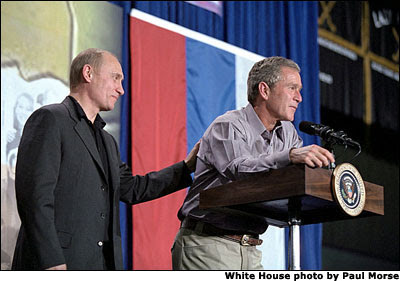Zonie63
Posts: 2826
Joined: 4/25/2011
From: The Old Pueblo
Status: offline

|
quote:
ORIGINAL: FellowSlave
quote:
Overall, Ukraine and Russia have ancient cultural ties to each other, in addition to the Crimea. But there's also a great deal of bad blood between them. I don't think it's a good idea for us to take sides in this kind of dispute, because it probably won't do any good, and in the end, both sides will end up hating us even more than they do now.
If we're judging the Russians as Soviet, then we should keep in mind that the Ukrainians were Soviet, too. But if we're looking at this thing through Cold War glasses, that may not give us an accurate picture.
Soviet Union was viewed as Russia by Russians. This is why Crimea being formally in Ukraine was not a problem. I do not think in his mind Putin thinks about Ukraine and Belorussia as truly sovereign countries.
There must be a very clear position in Crimea annexation issue. The Big Picture is Russia has gained strength (mainly because of high energy prices) and it started what it has historically done many times: expanding its borders outwards. Building empires is Russia's sacred role in history. Multi-polar World, Russia as one of the power centers - these are Putin's statements he repeats over and over. It does require push-back and counter measures be taken. Russia today is not as strong as it behaves: the population of Russia is shrinking, the government is in essence fascist kleptocracy, the army had great difficulties to defeat Chechen liberation movement.
Russia has a complicated history, although from a Russian point of view, they would likely argue that their history of expansionism and empire building was a necessary evil considering their geography and how many times they've been invaded by outsiders. The bulk of their landmass was gained as a result of the power vacuum left after the fall of the Mongol Empire (in which the Moscow Boyars played an instrumental role).
I wouldn't call empire-building their "sacred role in history." If they had any kind of "sacred role," it might revolve around the notion that Moscow was considered the Third Rome. In this perception, Rome is considered the First Rome (obviously), but Orthodox Constantinople was considered the Second Rome as the center of the Eastern Roman Empire. Once Constantinople fell, Russians believed that Moscow became the Third Rome as the center of Orthodoxy.
They see their role as paternalistic and protective of the Orthodox world. Apart from that, their main goal in empire-building was more defensive in nature. They had their ancient enemies, the Germans, to their west. They had the Turkish threat to their south. And they were still worried about potential incursions from the east. They had limited access to the sea, so commerce and communication were difficult.
I think at this point, Putin needs to rally his own people behind him. He's in a tight spot politically, so the best way to gain public support is to play the national pride and unity game. He's likely expecting and hoping the West will push back and take counter-measures against him, so that he can claim to be defending Mother Russia against outside interference, which is something that Russians will identify with and support wholeheartedly. I think the main worry is that Ukraine might become more pro-Western and part of NATO. We've already brought in Eastern Europe, including the former Soviet Baltic Republics, into NATO, so from their point of view, we're the ones who have been doing all the pushing, not them. They see us as acting aggressively and see a need to "push back" against us.
|

 Profile
Profile





 New Messages
New Messages No New Messages
No New Messages Hot Topic w/ New Messages
Hot Topic w/ New Messages Hot Topic w/o New Messages
Hot Topic w/o New Messages Locked w/ New Messages
Locked w/ New Messages Locked w/o New Messages
Locked w/o New Messages Post New Thread
Post New Thread